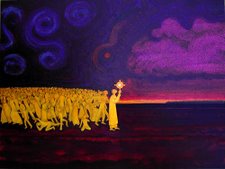[By Damon Linker, The New Republic]
Excerpt: ..."ndeed, the tone of today's atheist tracts is so unremittingly hostile that one wonders if their authors really mean it when they express the hope, as Dawkins does in a representative passage, that "religious readers who open [The God Delusion] will be atheists when they put it down." Exactly how will such conversions be accomplished? Rather than seeking common ground with believers as a prelude to posing skeptical questions, today's atheists prefer to skip right to the refutation. They view the patient back and forth of dialogue--the way of Socrates--as a waste of time.
It is with this enmity, this furious certainty, that our ideological atheists lapse most fully into illiberalism. Politically speaking, liberalism takes no position on theological questions. One can be a liberal and a believer (as were Martin Luther King Jr., Reinhold Niebuhr, and countless others in the American past and present) or a liberal and an unbeliever (as were Hook, Richard Rorty, and a significantly smaller number of Americans over the years). This is in part because liberalism is a philosophy of government, not a philosophy of man--or God. But it is also because modern liberalism derives, at its deepest level, from ancient liberalism--from the classical virtue of liberality, which meant generosity and openness. To be liberal in the classical sense is to accept intellectual variety--and the social complexity that goes with it--as the ineradicable condition of a free society.
It is to accept, in other words, that, although I may settle the question of God to my personal satisfaction, it is highly unlikely that all of my fellow citizens will settle it in the same way--that differences in life experience, social class, intelligence, and the capacity for introspection will invariably prevent a free community from reaching unanimity about the fundamental mysteries of human existence, including God. Liberal atheists accept this situation; ideological atheists do not. That, in the end, is what separates the atheism of Socrates from the atheism of the French Revolution...
...Still, the rise of the new atheists is cause for concern--not among the targets of their anger, who can rest secure in the knowledge that the ranks of the religious will, here in America, dwarf the ranks of atheists for the foreseeable future; but rather among those for whom the defense of secular liberalism is a high political priority. Of course, many of these secular liberals are probably the same people who propelled Dawkins, Dennett, Harris, and Hitchens onto the best-seller lists by purchasing their books en masse--people who are worried about the dual threats to secular politics posed by militant Islam and the American religious right. These people are correct to be nervous about the future of secular liberalism, to perceive that it needs passionate, eloquent defenders. The problem is that the rhetoric of Dawkins, Dennett, Harris, and Hitchens will undermine liberalism, not bolster it: Far from shoring up the secular political tradition, their arguments are likely to produce a country poised precariously between opposite forms of illiberalism.
The last thing America needs is a war of attrition between two mutually exclusive, absolute systems of belief. Yet this is precisely what the new atheists appear to crave. The task for the rest of us--committed to neither dogmatic faith nor dogmatic doubt--is to make certain that combatants on both sides of the theological divide fail to get their destructive way. And thereby to ensure that liberalism prevails."
Friday, December 7, 2007
Subscribe to:
Post Comments (Atom)



No comments:
Post a Comment